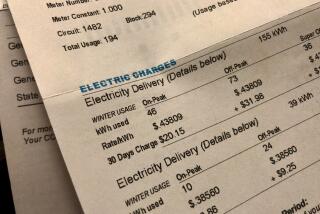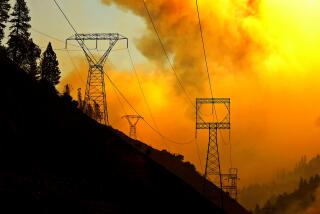Power Struggle: THE HUNDRED-YEAR WAR OVER ELECTRICITY by Richard Rudolph and Scott Ridley (Harper & Row: $19.95; 305 pp.)
- Share via
The best part of this mix of industrial history and investigative journalism is the lusty story of the electric utility industry’s origins, which takes up the first third of the book. It turns out, the notion of state commissions regulating private electric monopolies did not come from populist reformers. It was thought up by the industry as a weakened alternative to outright public (which usually meant municipal) ownership--the real goal of the populists. The father of the thought was Samuel Insull, an administrative genius, a rascal, but also, in his way, a statesman who saw what it would take to spread the new energy technology. An assistant to Edison at 21, and an electricity mogul soon after, Insull convinced his fearful colleagues at the turn of the century that state commissions would be no match for industry experts and lawyers, and neither would the municipal utilities.
The result for three decades was, as the authors stress, a bonanza for the private electric utilities, but it was also a rapid expansion in the United States of electric generation, long- distance transmission, industrial and home use and finally--though about this they say little--reduced power costs. In fact, the rapid conversion to electricity gave American industry a decisive productivity edge over European in the teens of the century, and after World War I, made the American living standard the envy of the world.
The economic crash brought down the financially overextended electric utility empires, including, after a nasty shove from the Morgan interests, Insull’s holding companies. In 1932, presidential candidate Roosevelt attacked the “Insull monstrosity” for inflating assets, milking subsidiaries, and hiding terrific overcharges from sister corporations. As for the public utility commissions, he attacked them for passivity. Such a commission must, he said, “be a tribune of the people . . . getting the facts and doing justice to both consumers and investors. . . .” As President, Roosevelt pushed for reform legislation, and the current structure of the electric utility industry--fragmented, with fairly strict limits on holding companies--stems in large part from that reaction to Insull’s misdeeds. Roosevelt also pressed for rural development and large publicly owned electric projects in the Tennessee Valley and in the Northwest, reversing the trend of several decades.
Post-World War II history saw a many-fold increase in electricity use, and also the rise--and stall--of nuclear electric generation. The authors see nuclear power, with its very large capital expenditures, as a vehicle to bilk the public.
Here they come to the true subject of their book, but here, unfortunately, the quality of the authors’ thinking and writing takes a dive before their biases. What follows is an ill-considered call to arms for citizens to stop a “second coming” of nuclear power and for a public takeover of the electric utilities. (The effort at public regulation is written off as a hopeless failure.) Since there isn’t, in fact, any nuclear “second coming” in sight, the authors are reduced to viewing with alarm some silly predictions of nuclear boosters.
And their analysis of the public versus private ownership question is simple-minded, to say the least. The worst economic debacles connected with nuclear power construction took place at publicly owned utilities. The Washington Public Power Supply System, made up of the small municipal utilities the authors celebrate, tried to build five large nuclear plants, lost control, and had to abandon four of them, some near completion. This triggered the largest municipal bond collapse in history. And TVA’s seven-plant nuclear power program (out of an original 17) is dead in the water because construction materials and methods did not comply with federal regulations. The authors have not adequately confronted these public sector failures.
One wishes they had encountered a competent editor who might have helped them turn their interesting material into a serious book. As it is, publication can only be described as premature.
More to Read
Sign up for our Book Club newsletter
Get the latest news, events and more from the Los Angeles Times Book Club, and help us get L.A. reading and talking.
You may occasionally receive promotional content from the Los Angeles Times.










